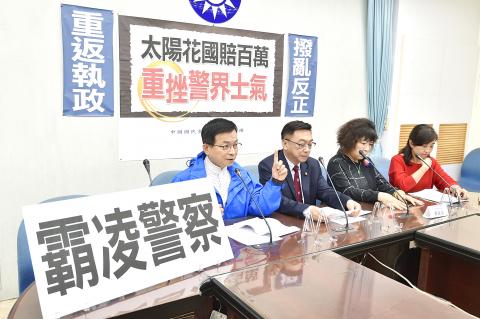The Taipei City Police Department yesterday said that it would appeal a ruling passed down by the Taipei District Court on Wednesday that ordered it to compensate then-legislator Chou Ni-an (周倪安) and 13 other protesters who stormed the Executive Yuan in the 2014 Sunflower movement a total of NT$1.11 million (US$36,439).
At a question-and-answer session at the Taipei City Council, Chinese Nationalist Party (KMT) Taipei City Councilor Wang Hung-wei (王鴻薇) asked Taipei Mayor Ko Wen-je (柯文哲) and department Commissioner Chen Jia-chang (陳嘉昌) whether the ruling would be appealed.
Ko said that he would mull over the issue after the city government receives the ruling.

Photo: Tu Chien-jung, Taipei Times
The incident is political in nature and should be handled through political means rather than through legal channels, he said.
If the department does not appeal, the issue could evolve into one that involves state compensation, and by then police who evicted the protesters during the occupation of the Executive Yuan could be held accountable, which would not be fair to them, he added.
The department’s stance on the issue is to appeal, Ko said, adding that he would deliberate whether the issue could be resolved “politically.”
During questioning later by Democratic Progressive Party (DPP) Taipei City Councilor Chang Mao-nan (張茂楠), Ko said that it should be clarified who gave the order to forcibly evict the protesters.
“The National Police Agency oversaw the operation. It could not have been the Taipei City Police Department. Just sue the higher-ups,” Ko said.
Chen later said that the department would appeal the ruling to protect the rights of police officers.
Even though Ko was reserved in his response to Wang, the mayor has always stood with Taipei police, Chen added.
Separately yesterday, the KMT legislative caucus protested and expressed regret over the ruling, urging the department to appeal.
The ruling has negatively affected police morale and ignored the principles followed by law enforcement of protecting law-abiding people, cracking down on illegal activities and quelling violence, KMT caucus deputy secretary-general Arthur Chen (陳宜民) said, adding that the presiding judge apparently adjudicated the case based solely on protesters’ testimony, without putting the eviction into context.
“There have been no photographs or video footage of officers attacking civilians,” Chen added.
After the DPP returned to power in the 2016 presidential election, then-premier Lin Chuan (林全) quickly dropped all charges the former KMT administration had pressed against protesters who stormed the Executive Yuan, as they “had helped the DPP win the election,” KMT Legislator Lai Shyh-bao (賴士葆) said.
He questioned whether the court had issued a political ruling at the expense of the legitimacy of law enforcement.
The department must appeal the ruling, otherwise it could leave police at a loss as to how to enforce the law, Lai said.
KMT Legislator Lin Yi-hua (林奕華) said that police would have been in dereliction of duty had they not evicted the protesters.
She accused the DPP of applying a double standard, as it last year also adopted a heavy-handed approach when it sent police to evict pension reform protesters from the Legislative Yuan.

The CIA has a message for Chinese government officials worried about their place in Chinese President Xi Jinping’s (習近平) government: Come work with us. The agency released two Mandarin-language videos on social media on Thursday inviting disgruntled officials to contact the CIA. The recruitment videos posted on YouTube and X racked up more than 5 million views combined in their first day. The outreach comes as CIA Director John Ratcliffe has vowed to boost the agency’s use of intelligence from human sources and its focus on China, which has recently targeted US officials with its own espionage operations. The videos are “aimed at

STEADFAST FRIEND: The bills encourage increased Taiwan-US engagement and address China’s distortion of UN Resolution 2758 to isolate Taiwan internationally The Presidential Office yesterday thanked the US House of Representatives for unanimously passing two Taiwan-related bills highlighting its solid support for Taiwan’s democracy and global participation, and for deepening bilateral relations. One of the bills, the Taiwan Assurance Implementation Act, requires the US Department of State to periodically review its guidelines for engagement with Taiwan, and report to the US Congress on the guidelines and plans to lift self-imposed limitations on US-Taiwan engagement. The other bill is the Taiwan International Solidarity Act, which clarifies that UN Resolution 2758 does not address the issue of the representation of Taiwan or its people in

SHIFT: Taiwan’s better-than-expected first-quarter GDP and signs of weakness in the US have driven global capital back to emerging markets, the central bank head said The central bank yesterday blamed market speculation for the steep rise in the local currency, and urged exporters and financial institutions to stay calm and stop panic sell-offs to avoid hurting their own profitability. The nation’s top monetary policymaker said that it would step in, if necessary, to maintain order and stability in the foreign exchange market. The remarks came as the NT dollar yesterday closed up NT$0.919 to NT$30.145 against the US dollar in Taipei trading, after rising as high as NT$29.59 in intraday trading. The local currency has surged 5.85 percent against the greenback over the past two sessions, central

US Indo-Pacific Commander Admiral Samuel Paparo on Friday expressed concern over the rate at which China is diversifying its military exercises, the Financial Times (FT) reported on Saturday. “The rates of change on the depth and breadth of their exercises is the one non-linear effect that I’ve seen in the last year that wakes me up at night or keeps me up at night,” Paparo was quoted by FT as saying while attending the annual Sedona Forum at the McCain Institute in Arizona. Paparo also expressed concern over the speed with which China was expanding its military. While the US